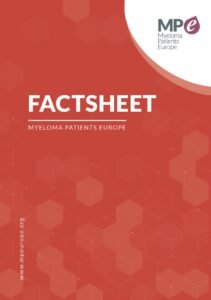What is idecabtagene vicleucel (Abecma®)?
Idecabtagene vicleucel is a chimeric antigen receptor T-cell therapy (CAR-T therapy) for the treatment of adult patients with relapsed and refractory multiple myeloma, who have received at least three previous lines of therapy, including an immunomodulatory agent, a proteasome inhibitor and an anti- CD38 antibody, and whose disease has progressed since receiving the last treatment.
Idecabtagene vicleucel received orphan drug designation (a status assigned to medicines developed for rare disease conditions that affect fewer than five patients per 10,000 inhabitants in the EU) on 20th April 20172. It was granted Conditional Marketing Authorisation from the European Commission in June 2021 with validity throughout the European Union from 18th August 2021.
Conditional Marketing Authorisation means that the company manufacturing idecabtagene vicleucel (BMS/Celgene) is required to provide further evidence on the safety and efficacy of the drug as this evidence becomes available from ongoing clinical trials (most importantly, data on long term safety is still expected). Idecabtagene vicleucel is the first CAR-T therapy to be approved for the treatment of multiple myeloma.
How does idecabtagene vicleucel work?
Idecabtagene vicleucel is a type of CAR-T therapy. This type of CAR-T treatment uses a patient’s own white blood cells to make a treatment specific to that individual. There are various types of white blood cells, such as B cells and T cells, which play vital roles in the body’s immune response to infection or cancer. CAR-T therapy modifies and utilises T cells to direct them to destroy cancerous myeloma cells.
This is achieved through equipping the T cells with a protein molecule called a “chimeric antigen receptor” (CAR). The CAR resides on the surface of T cells and can instruct T cells to find, bind to and destroy cancerous myeloma cells. More specifically, idecabtagene vicleucel targets B cell maturation antigen (BCMA), a protein that is present on the surface of myeloma cells.
What are the benefits of idecabtagene vicleucel?
The phase 2 KarMMa clinical trial4 (NCT03361748) investigated the safety and efficacy of idecabtagene vicleucel in adult patients with relapsed or refractory multiple myeloma, who had received at least three prior lines of therapy and continued to have worsening disease or no response to their last treatment.
Out of the 140 patients enrolled, 94 responded to the treatment and remained in remission for approximately 11 months. Of the 140 participants, 42 had a complete response (their cancer was not detectable using conventional diagnostic methods) and 33 patients achieved a minimal residual disease (MRD) negative status (no cancer cells could be detected using advanced diagnostic techniques).
What are the side-effects of idecabtagene vicleucel?
Potential toxic effects of idecabtagene vicleucel include:
- Cytokine release syndrome (a systemic inflammatory condition that appears as a flu-like illness and includes fever, fatigue, nausea, headache, shortness of breath, high heart rate, altered mental state and difficulty speaking, which is commonly treated with steroids and/or a drug called tocilizumab)
- Neutropenia (low levels of neutrophils, a type of white blood cell also known as an immune cell)
- Anaemia (low red blood cell count)
- Thrombocytopenia (low levels of platelets, a component of blood important for clotting)
Albeit rare, neurotoxic effects (affecting 23 patients during the KarMMa trial) may occur; these can appear as confusion, fatigue, headache, agitation and in rare but severe cases, seizures.
How and when is idecabtagene vicleucel given?
Idecabtagene vicleucel is created by collecting some of your own T-cells (through a process called leukapheresis), genetically modifying them, growing them in a laboratory and then infusing them back into your blood. The infusion will be carried out in a certified healthcare facility.
Before the infusion, you will receive chemotherapy (also known as lymphodepleting therapy) to reduce the level of white blood cells and help your body accept the CAR-T cells. Following treatment with idecabtagene vicleucel, you will be closely monitored in the certified healthcare facility for at least seven days for any side effects to show and must remain in the proximity of the facility for at least four weeks.
References
- First cell-based gene therapy to treat adult patients with multiple myeloma | European Medicines Agency. https://www.ema.europa.eu/en/news/first-cell-based-gene-therapy-treat-adult-patients-multiple-myeloma
- Abecma – European Medicines Agency. European Medicines Agency. (2021). Retrieved in November 2021. https://www.ema.europa.eu/en/medicines/ human/EPAR/abecma
- CHMP. Abecma; INN-idecabtagene vicleucel. https://www.ema.europa.eu/en/ documents/assessment-report/abecma-epar-public-assessment-report_en.pdf
- NC, M. et al. Idecabtagene Vicleucel in Relapsed and Refractory Multiple Myeloma. The New England Journal of Medicine 384, 705–716 (2021)
